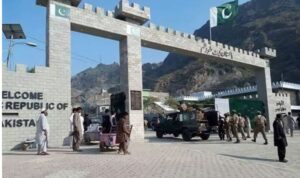PESHAWAR: The last reel flickers, the screen goes dark, and another cinema vanishes into memory. Naz Cinema, once a sanctuary of dreams in Peshawar, is no more—its final act reduced to rubble, soon to be replaced by yet another commercial plaza.
For nearly a century, Naz Cinema wasn’t just a building. It was an escape. A place where stories came to life, where generations sat in the dim glow of a projector, lost in a world far from their own. But in a city where cinema once thrived, the silver screen is fading, and no one seems to notice.
A Legacy in Ruins
Long before it became Naz Cinema, this place had another name. In 1942, a Sikh entrepreneur established ‘White Rose Cinema’ in the heart of Peshawar. It stood tall through the turbulent years, witnessing the partition of 1947. When Pakistan was born, the theater changed hands—bought by the grandfather of its current owner, Jawad Raza Khan. It remained in the Khan family for generations, a symbol of endurance and entertainment.
A Desperate Fight Against Time
Naz Cinema tried to survive. It fought against irrelevance with a brand-new 3D screen, plush seating, and a family-friendly makeover. It even curated superhit English and Hindi films, hoping to revive the magic.But the city had moved on. The shiny new seats remained empty, the state-of-the-art 3D screen played to no one.
The people who once filled these halls had left—some to streaming platforms, others to malls, and many simply forgetting what it felt like to sit in a cinema, surrounded by strangers, united by a story.
The Final Curtain on Peshawar’s Film Culture
Once, Peshawar pulsed with the glow of 50 cinemas. Their names—Novelty, Firdous, Palwasha, Aman, Ishrat—were etched into the city’s identity. Families, lovers, and dreamers gathered there, bound by a love for film.Today, only four remain, standing on borrowed time. Naz Cinema had seen it all—the rise of Pakistani cinema, the fall of Lollywood, the golden era of film. It even survived war and political instability. But what it could not survive was greed.
Who Killed The Cinema?
The death of Peshawar’s cinemas isn’t just the work of Netflix, YouTube, or changing habits. It’s a business deal. A land grab. A betrayal.
Powerful political figures and business tycoons are swallowing up these cultural landmarks, bulldozing history, and replacing it with concrete towers. The land once meant for art is now another real estate venture. “A cinema was never just a place to watch movies,” says a former theater owner. “It was where we lived out our fantasies.
But in this city, money speaks louder than memories.”A cinema is more than a building—it is a living archive of a city’s joy, heartbreak, and nostalgia.But as the last few cinemas of Peshawar wait for their inevitable end, the city is erasing a part of itself. And one day, when the last screen goes dark, someone will walk past and ask:
“What stood here before?”
And there will be no one left to answer.
.












